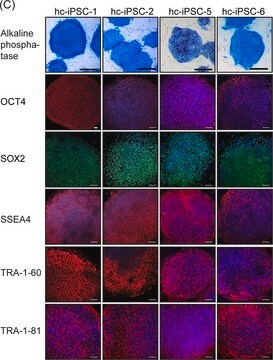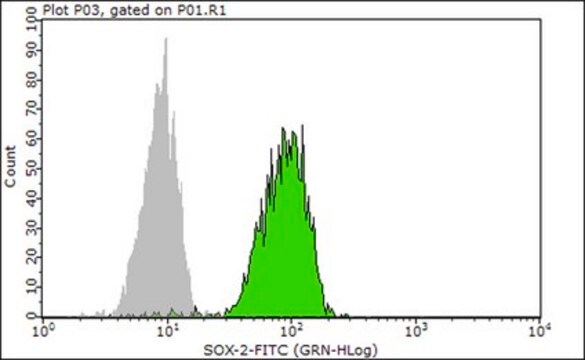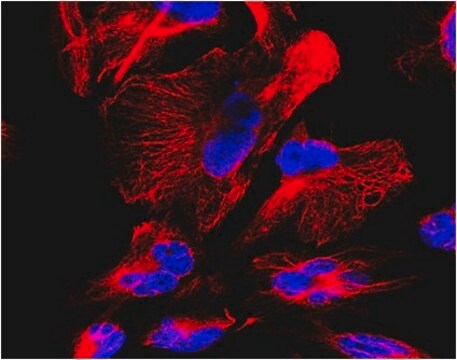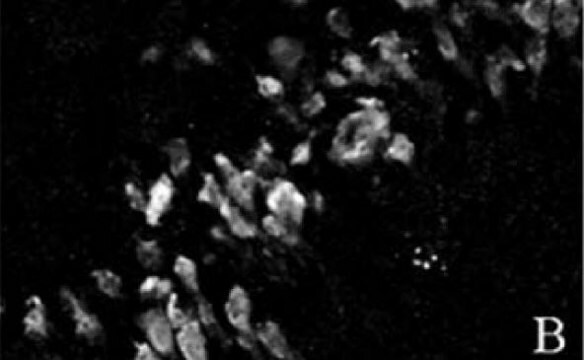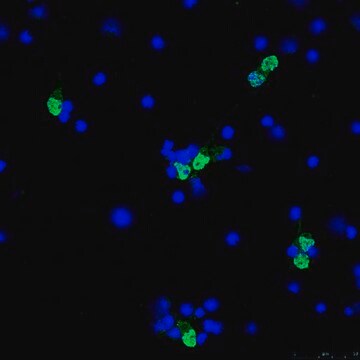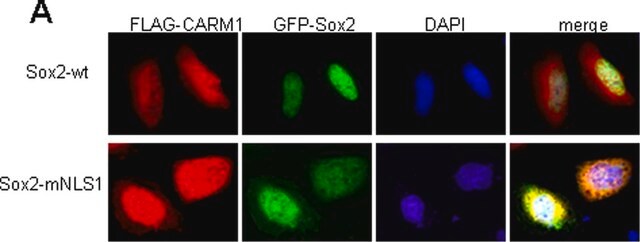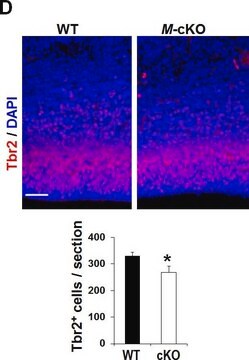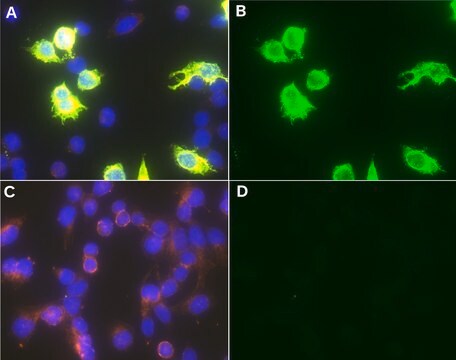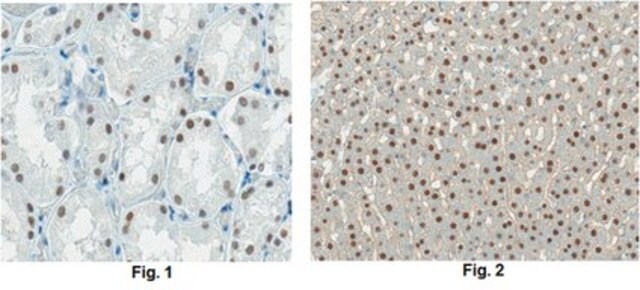おすすめの製品
由来生物
rabbit
品質水準
結合体
ALEXA FLUOR™ 488
抗体製品の状態
affinity isolated antibody
抗体製品タイプ
primary antibodies
クローン
polyclonal
化学種の反応性
human
化学種の反応性(ホモロジーによる予測)
mouse (based on 100% sequence homology), rat (based on 100% sequence homology)
メーカー/製品名
Milli-Mark®
テクニック
flow cytometry: suitable
アイソタイプ
IgG
NCBIアクセッション番号
UniProtアクセッション番号
輸送温度
wet ice
ターゲットの翻訳後修飾
unmodified
遺伝子情報
human ... NANOG(79923)
詳細
NANOG is a gene expressed in embryonic stem cells (ESCs) and is thought to be a key factor in maintaining pluripotency. NANOG thought to function in concert with other factors such as POU5F1 and SOX2 to establish ESC identity. These cells offer an important area of study because of their ability to maintain pluripotency, i.e., these cells have the ability to become virtually any cell of any of the three germ layers (endoderm, ectoderm, mesoderm).
NANOG may be useful in the immunohistochemical diagnosis of tumors. NANOG is expressed in germ cells of the fetus and in some germ cell tumors of the gonads and central nervous system (CNS).
NANOG may be useful in the immunohistochemical diagnosis of tumors. NANOG is expressed in germ cells of the fetus and in some germ cell tumors of the gonads and central nervous system (CNS).
特異性
Antibody recognizes NANOG.
免疫原
Epitope: N-terminus
Linear peptide from mouse Nanog.
アプリケーション
Research Category
幹細胞研究
幹細胞研究
Research Sub Category
多能性及び初期分化
多能性及び初期分化
Milli-Mark Anti-Nanog-Alexa Fluor 488 Antibody, N-terminus is an antibody against Nanog-Alexa Fluor 488 for use in FC.
品質
Evaluated by flow cytometry using 2102 Ep cells
ターゲットの説明
34 kDa Calculated
物理的形状
Antigen Affinity Purified
Purified rabbit polyclonal IgG conjugated to Alexa Fluor™ 488 in PBS with 0.1% sodium azide and 15 mg/mL BSA
保管および安定性
Maintain refrigerated at 2-8 °C protected from light in undiluted aliquots for up to 6 months from date of receipt.
アナリシスノート
Control
2102 Ep cells
2102 Ep cells
法的情報
ALEXA FLUOR is a trademark of Life Technologies
MILLI-MARK is a registered trademark of Merck KGaA, Darmstadt, Germany
免責事項
Unless otherwise stated in our catalog or other company documentation accompanying the product(s), our products are intended for research use only and are not to be used for any other purpose, which includes but is not limited to, unauthorized commercial uses, in vitro diagnostic uses, ex vivo or in vivo therapeutic uses or any type of consumption or application to humans or animals.
適切な製品が見つかりませんか。
製品選択ツール.をお試しください
保管分類コード
12 - Non Combustible Liquids
WGK
WGK 2
引火点(°F)
Not applicable
引火点(℃)
Not applicable
適用法令
試験研究用途を考慮した関連法令を主に挙げております。化学物質以外については、一部の情報のみ提供しています。 製品を安全かつ合法的に使用することは、使用者の義務です。最新情報により修正される場合があります。WEBの反映には時間を要することがあるため、適宜SDSをご参照ください。
Jan Code
FCABS352A4:
試験成績書(COA)
製品のロット番号・バッチ番号を入力して、試験成績書(COA) を検索できます。ロット番号・バッチ番号は、製品ラベルに「Lot」または「Batch」に続いて記載されています。
Rong Li et al.
Stem cell research, 34, 101374-101374 (2019-01-15)
Noonan syndrome with multiple lentigines (NSML), formerly known as LEOPARD Syndrome, is a rare autosomal dominant disorder. Approximately 90% of NSML cases are caused by missense mutations in the PTPN11 gene which encodes the protein tyrosine phosphatase SHP2. A human
Amanda Baskfield et al.
Stem cell research, 37, 101436-101436 (2019-04-23)
Niemann-Pick disease type B (NPB) is a rare autosomal recessive lysosomal storage disease caused by mutations in the SMPD1 gene, which encodes for acid sphingomyelinase. A human induced pluripotent stem cell (iPSC) line was generated from dermal fibroblasts of a
Manisha Pradhan et al.
Stem cell research, 54, 102400-102400 (2021-05-30)
NGLY1 deficiency is a rare disorder caused by mutations in the NGLY1 gene which codes for the highly conserved N-glycanase1 (NGLY1). This enzyme functions in cytosolic deglycosylation of N- linked glycoproteins. An induced pluripotent stem cell (iPSC) line was generated
Wei Huang et al.
Stem cell research, 37, 101427-101427 (2019-04-02)
Mucopolysaccharidosis type III B (MPS IIIB) is a lysosomal storage disorder caused by mutations in the NAGLU gene encoding N-acetylglucosaminidase. Here, we report the generation of a human induced pluripotent stem cell (iPSC) line from dermal fibroblasts of a MPS
Junjie Hong et al.
Stem cell research, 37, 101451-101451 (2019-05-10)
Mucopolysaccharidosis Type II (MPS II), also known as Hunter syndrome, is a rare X-linked genetic disease caused by mutations in the IDS gene encoding iduronate 2-sulfatase (I2S). This is a multisystem disorder with significant variation in symptoms. Here, we document
ライフサイエンス、有機合成、材料科学、クロマトグラフィー、分析など、あらゆる分野の研究に経験のあるメンバーがおります。.
製品に関するお問い合わせはこちら(テクニカルサービス)